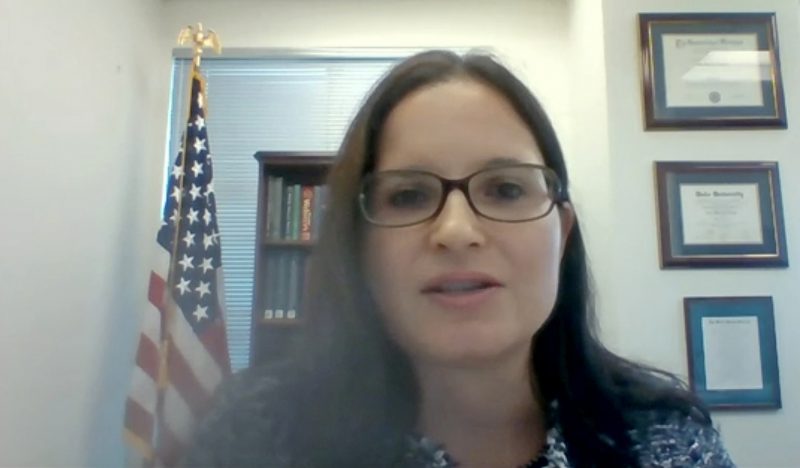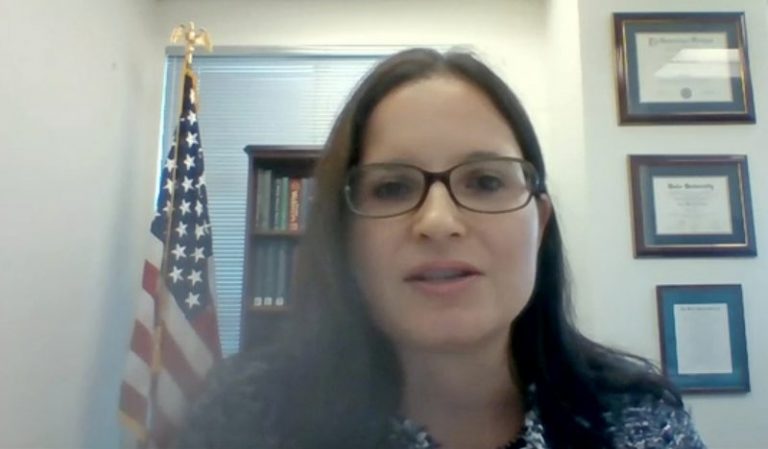
Aileen M. Cannon, the federal judge in Florida who has been initially assigned to oversee the criminal case against former president Donald Trump over alleged obstruction and mishandling of classified documents, is a former prosecutor whose profile soared last year when she intervened in the Justice Department’s investigation of the case.
At the time, the Trump-appointed judge ruled in the former president’s favor when his legal team argued that he retained his executive privilege after leaving office, maintaining the right to shield at least some of the documents from review. She appointed a special master in the case and temporarily halted FBI access to classified documents taken in a court-approved search.
Her ruling slowed down the government’s investigation, but a conservative-leaning federal appeals court later struck down her decision.
Cannon could have a significant role in the case, including whether to set a trial date before the November 2024 election. She could also rule on motions to dismiss counts — or the entire indictment — and determine which evidence could be excluded. Those rulings are generally subject to appeal and review by higher courts.
Ongoing investigations involving Donald Trump
1/7
End of carousel
The conservative judge was nominated by Trump in 2020 and received some Democratic support at her hearing, when 12 Senate Democrats voted in favor of her confirmation. She was one of 14 Trump nominees confirmed after he lost the November 2020 election.
Cannon was born in Colombia in 1981 and grew up in Miami, the daughter of a Cuban immigrant mother. As an undergraduate at Duke University, she worked one summer for the Spanish-language newspaper El Nuevo Herald, writing on prenatal yoga and Flamenco.
Cannon later joined the Federalist Society, the conservative organization that played a major role in advising Trump on his judicial picks, while attending the University of Michigan Law School. She was drawn to its discussion of “the limited role of the judiciary to say what the law is — not to make the law,” she said in response to Senate questions during her confirmation hearing.
She clerked for Steven M. Colloton, a judge on the U.S. Court of Appeals for the 8th Circuit who was on Trump’s list of potential Supreme Court picks, and spent much of her career as a litigator.
As a prosecutor in the U.S. attorney’s office in South Florida in 2013, Cannon handled drug, firearm and immigration cases.
Later, while working in the appellate division, she was assigned to defend the government’s conviction in a large-scale life insurance fraud case.
“She’s quick, talented and bright,” said Richard Klugh, the lawyer on the other side of that case representing the defendants on appeal. “There’s no getting around it. She’s very effective.”
Cannon prevailed in the case, sustaining the conviction of the Florida lawyer in the life insurance scheme that drew in thousands of investors.
During her confirmation hearing, Cannon said she considers herself an “originalist” and a “textualist,” referring to methods of legal interpretation that look to the general understanding of the Constitution at the time it was written, an approach most often associated with the late conservative Supreme Court justice Antonin Scalia.
Sen. Dianne Feinstein (D-Calif.) asked Cannon whether she had discussions during the nomination process about “loyalty to President Trump.”
“No,” Cannon responded in writing.
Before Cannon’s controversial ruling last year, which she called necessary to “ensure at least the appearance of fairness and integrity,” she had been on the bench for less than two years. One of her most high-profile cases involved sentencing a man from Florida who pleaded guilty to making death threats against then-House Speaker Nancy Pelosi (D-Calif.) and Rep. Alexandria Ocasio-Cortez (D-N.Y.).
In another case last year, a judicial colleague accused Trump of judge-shopping for Cannon by filing a lawsuit against Hillary Clinton and former FBI agents in the court’s Fort Pierce division, where Cannon is the only federal judge.
History of investigations involving Donald Trump
1/7
End of carousel
“Despite the odds, this case landed with me instead,” wrote Judge Donald M. Middlebrooks, who was appointed by President Bill Clinton. Middlebrooks dismissed the case in September.
After a 34-year-old man threw a chair and threatened to kill a prosecutor in court last year, Cannon tacked on more than six years to his existing 17½-year sentence on gun charges.
Trump could make his initial appearance in front of Cannon on Tuesday or Federal Magistrate Judge Bruce E. Reinhart, who signed off on the government’s request for a warrant to search Mar-a-Lago and whose name was also on the court-issued summons given to Trump’s attorneys, according to people familiar with the document.
Perry Stein, Jacqueline Alemany and Spencer S. Hsu contributed to this report.


Comments are closed.